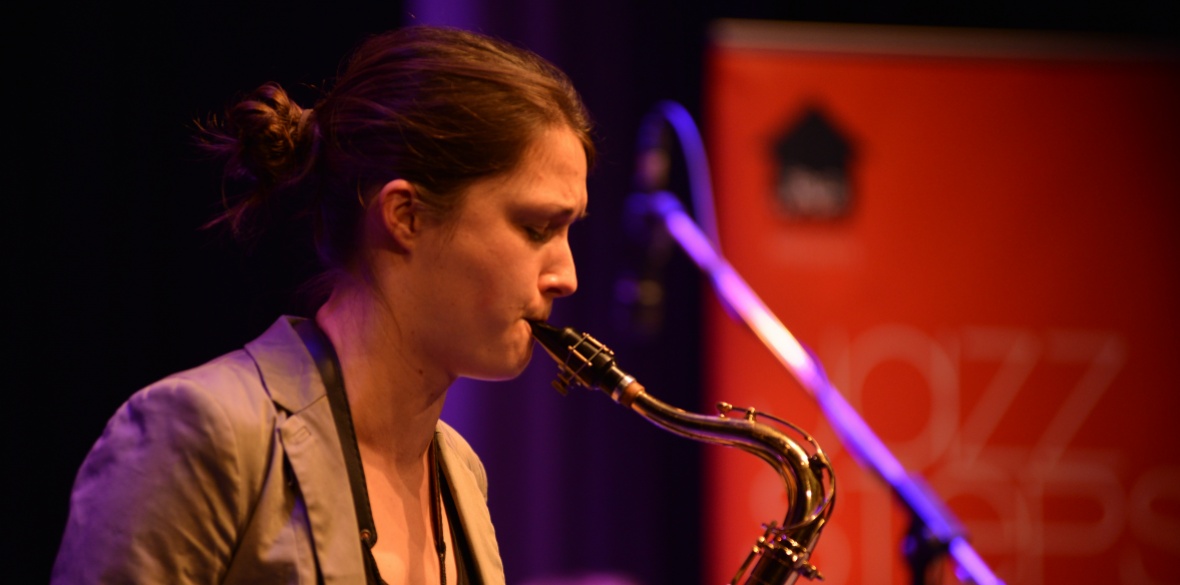This is the last article you can read this month
You can read more article this month
You can read more articles this month
Sorry your limit is up for this month
Reset on:
Please help support the Morning Star by subscribing here
“A TON of ideas for new tunes,” was one of the positives of Trish Clowes’s 2017 tour with her band My Iris.
Those tunes are there on her fifth album Ninety Degrees Gravity, the result of “a lot of back and forth” between her and guitarist Chris Montague, drummer James Maddren and Ross Stanley on piano and organ. “We allow the music to evolve, there’s so much scope for different sound-worlds,” she says.
The album’s title relates to Denis Villeneuve’s sci-fi film Arrival, where humans enter an alien pod and gravity shifts. “There are so many things I love about that film,” she enthuses. “Most of all, the hope that comes from communication and understanding between different peoples and beings.”
Another stimulus was the 1972 Weather Report album Live in Tokyo and the hurricane drumming of Eric Gravatt on the record, with two tracks of Ninety Degrees Gravity referencing his performance.
“That band was one giant cauldron of ideas and experiments,” she declares. “Just mind-boggling — the colours, the open improvising, the interactions, ideas and compositions.
“Gravatt’s drumming is outrageous – the power is absolutely astonishing and so exciting to listen to. Just imagine if I’d been able to hear that live.”
Clowes lists Lester Young, Sonny Rollins, Joe Henderson, Wayne Shorter, John Coltrane, Mark Shim and one of her teachers Iain Bellamy as tenor saxophonists who’ve had a big influence, along with virtuoso saxophonist Wayne Shorter, a surviving member of Weather Report, whom she met in California in 2013.
It was a “deeply inspiring” experience hearing him play so often and, after spending time with the veteran, she recalls, “I felt this kind of purpose — that you have to write your own story. You can’t be in or wish for somebody else’s. You have to embrace the unknown in your own life.”
Clowes’s saxophone often has a beautifully light, almost levitating timbre and that’s achieved, she says, “by a lot of heavy lifting from my lungs. You sound how you sound through the nature of your lungs, diaphragm, your insides.
“Obviously, your ear directs your sound too, encouraging your embouchure to make the sounds your ears like to hear.” That, she explains, produces the contrast between “lush lightness and raspy edginess.
“My favourite thing about the saxophone is the crazy variety of colours you can get from it. I’m still exploring.”
A few years back, I heard Clowes at a free lobby gig at the Barbican in London which coincided with Trump winning the US election. She gave an eloquent warning about him as she announced her tunes and she’s insightful about how jazz musicians can intervene against backward and racist political power.
“Sometimes artists make big statements and sometimes they’re much more subtle and you can’t know if or when something might affect another person,” she tells me. “Performing puts you into a real position of privilege and I just try to speak as honestly as I can, whether in words or through my playing.
“Music is a real medicine and one of its most powerful aspects is the space it gives people to reflect.”
Ninety Degrees Gravity is released on Basho Records.











